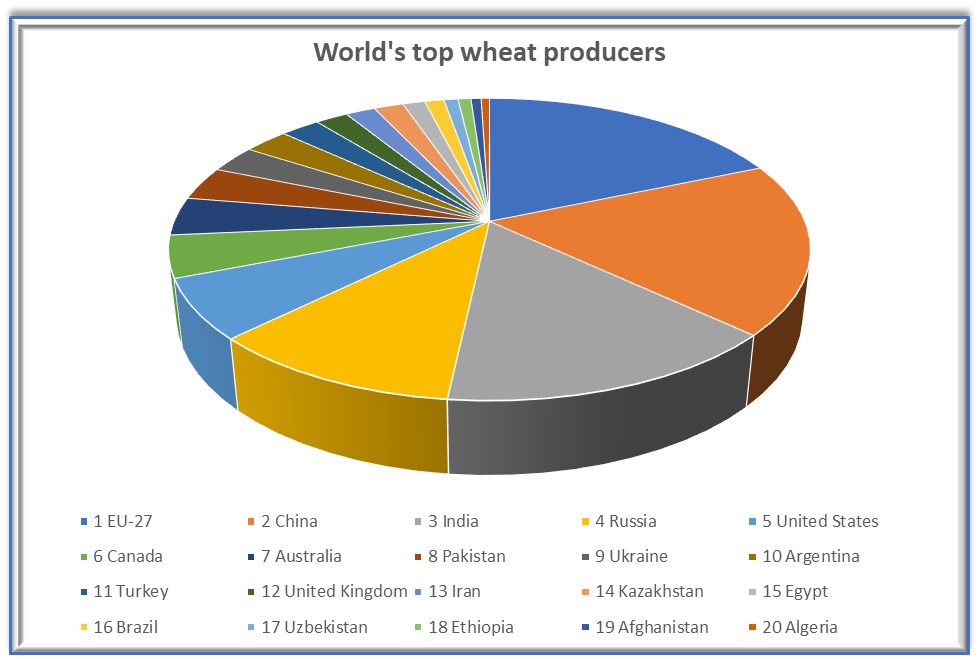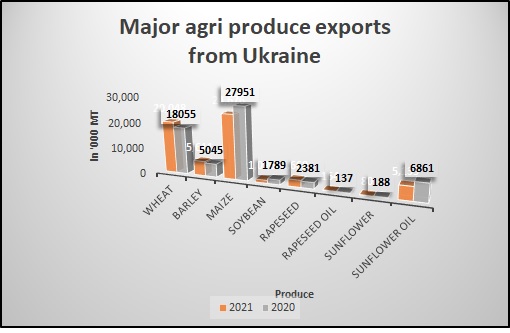

Violent protests over rising inflation
and power and fuel shortages have forced out Sri Lanka’s Prime Minister Mahinda
Rajapaksa. The Asian nation is a victim of a string of policy debacles over
decades but what tipped the plank were the twin economic blows of COVID-19 and the
war in Ukraine, according to Reuters. Indeed, the double whammy has the
world’s poorer nations reeling under increased food insecurity.
The tiny island nation of Sri Lanka
is not alone in bearing the brunt of the far-away war in Ukraine in which it has
no role. Queues snaking into Bangladesh’s public distribution centers are
getting longer each day. Thousands in Ethiopia are on the brink of starvation
death. Countries like Egypt and Nigeria that depend on wheat imports are
teetering on the edge. The World Bank has warned that the
war in Ukraine is creating a major humanitarian crisis across continents.

There are dozens of other countries
whose crawling recovery
from the COVID-induced economic misery was snuffed out by the war. Russian soldiers
have been marching across Ukraine trampling
on vast wheat fields and looting food grain silos. Vladimir Putin’smisadventure is making millions collateral victims across the globe as his naval
ships lay siege to Ukraine’s Black Sea ports that send out millions of tons of
food grains to feed billions.
As the ripples of the Kremlin’s
brinksmanship on the edge of a nuclear winter spread far and wide, the poor in
many countries are getting poorer and millions are newly dropping below the
poverty line. The world Bank says the food and energy price shocks
from the war could last for several years. Price protests are rattling regimes
and the weaker ones are tottering on the brink of collapse.
The United Nations estimates that while
the pandemic
shock pushed 77 million people into extreme poverty the Russian invasion of
Ukraine is threatening to sink 1.7 billion people — over a fifth of humanity —
into destitution and hunger.
Ukraine and Russia jointly provide
30% of the world’s wheat and barley, one-fifth of its maize, and over half of
its sunflower oil will no longer be able to meet the requirements, according to
a UN statement. The World Bank estimates
the Russian invasion can shrink the Ukrainian economy by 45%.
Calling the war in Ukraine as
“evil,” UN Secretary-General Antonio Guterres has flagged the alarming impact
of the war saying that while most attention is legitimately focused on the
effects of the
war on Ukrainians, it’s global fallout in a world that was already witnessing
increased poverty, hunger and social unrest should not be ignored. “We are now
facing a perfect storm that threatens to devastate the economies of developing
countries,” the UN chief said.
The ravages heaped on Ukrainians
are grave. International Labor Organization estimates nearly
5 million Ukrainians have lost their jobs since Russian
forces rolled across the borders on February 24. But its impact goes far
beyond Ukraine’s borders. Ukraine is one of the world’s largest producers of
wheat, corn and sunflower oil. Ukraine and Russia together share over a quarter
of the world's wheat exports. A major chunk of those exports has evaporated
with the war. Ukraine's Ministry of Agriculture estimates about 30% of the
country’s farmlands is occupied or unsafe.
A Food and Agricultural
Organization (FAO) study that shows how important Russia and Ukraine are for
global food security points out that they are among the world’s most important
agricultural commodities producers. “Both are net exporters of
agricultural products and are leading suppliers of foodstuffs and
fertilizers to global markets, where exportable supplies are often concentrated
in a handful of countries. The high concentrations could increase the
vulnerability of these markets to shocks and volatility. In 2021, either Russia
or Ukraine, or both, ranked among the top three global exporters of wheat,
barley, maize, rapeseed and rapeseed oil, sunflower seed and sunflower oil.
Russia also ranked as the world’s top exporter of nitrogen fertilizers, the second
leading supplier of potassic fertilizers and the third largest exporter of
phosphorous fertilizers.
Apart from the significant
footprint the two countries have in the export markets of key agricultural
produce like wheat, soybean, sunflower oil, barley, rapeseed, rapeseed oil and
maize, they are major
importers of several economically important agri products, according to the
FAO. The Western sanctions and a prolonged conflict could hit those imports and
slow many national economies.
According to the FAO, the top wheat
importers from Russia and Ukraine whom the conflict could severely affect are Egypt,
Turkey, Bangladesh, Nigeria, Yemen, Azerbaijan, Sudan, UAE, Senegal, Vietnam,
Indonesia, and The Philippines. The Western sanctions have put a lid on imports
from Russia while the Kremlin’s naval blockade has cut off all major Ukrainian
ports. There are many least developed countries (LDC) surviving on food imports
from Russian and Ukraine and thousands more int those countries will be pushed
to poverty if the food prices gallop beyond their means.
FAO estimates show that there are
at least 26 nations dependent
on either or both (Russia and Ukraine) for at least 50% of their wheat
requirements. Eritrea whose dependency is 100% is at one end of the spectrum
while Kyrgyzstan with about 50% dependency is at the other end. In between them
are many nations whose economies have been in the sickbed for long like
Somalia, Burundi, Armenia, Mongolia, Egypt, Pakistan, Namibia, Albania, Congo,
Rwanda, and Togo.
Even the countries that depend less
on wheat imports from the two warring nations will be affected for sure as the supplies
slip and prices soar. Some of them like Ethiopia, Nicaragua and Yemen that are economically
fragile might take a worse hit than the nations whose dependence on imports
from these two sources is more than half of their requirements.

Even the countries that do not
directly import food from Russia or Ukraine are getting caught in a welter of
price spike. Russia is a major exporter of fertilizers and its disappearance
from the markets because of the sanctions has pushed up the input costs of
farming leading to more downstream disruptions.
The countries under immediate threat
of slipping into famine from the war-induced crisis are Eritrea, Armenia, Somalia,
Azerbaijan, Mongolia, Madagascar, Lebanon, Egypt, Pakistan, Namibia, Albania,
Tanzania, Libya, Congo, Rwanda, Djibouti, Senegal, Cameroon, Togo, Mauritania, Burundi,
Kyrgyzstan.
We will be bringing you more updates
on the war-induced food and economic crisis.
Related News: